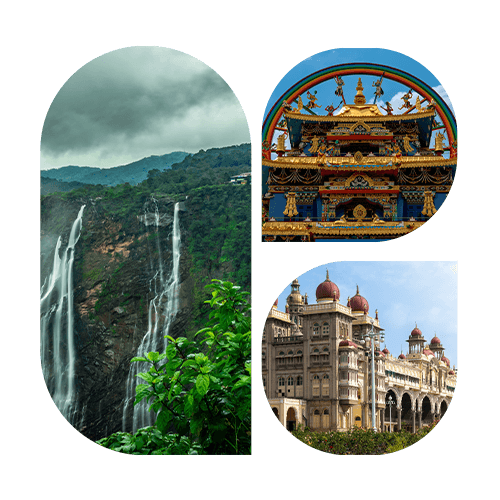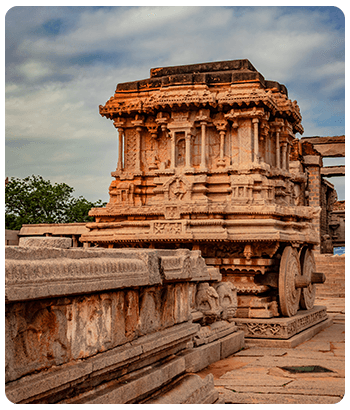

Karnataka, nestled in southwest India, offers a fascinating blend of ancient architectural marvels, pristine beaches, lush forests, and modern urban experiences. This diverse state takes visitors on a journey through time from prehistoric rock formations and ancient temple complexes to colonial-era hill stations and tech capitals. Karnataka's cultural depth, natural beauty, and innovation make it a land where imperial grandeur, traditional arts, wildlife, and contemporary development harmoniously coexist.
Significant destination blending UNESCO World Heritage sites, ecological diversity, architectural wonders, and technological innovation.
Diverse architectural styles from Hoysala to Indo-Islamic; classical Carnatic music; Yakshagana theater; Mysore paintings; silk weaving traditions; and distinctive regional festivals.
Rich culinary heritage featuring bisi bele bath, Mysore masala dosa, Coorg pork, Mangalorean seafood, Dharwad pedha, and distinctive filter coffee.
Famous for Mysore silk sarees, sandalwood carvings, Bidriware metal crafts, Channapatna wooden toys, Ilkal textiles, and coffee products.
Traditional dance performances, elaborate Dasara celebrations, vibrant temple festivals, wildlife safaris, heritage walks, and beach activities.
Ayurvedic retreats in Western Ghats, forest therapy experiences, yoga centers, beach resorts along the Konkan coast, and heritage palace stays.
Trekking in Western Ghats, white-water rafting on Kali River, scuba diving at Netrani Island, wildlife safaris, rock climbing at Hampi, and waterfall rappelling.
International airports, expanding highway network, luxury heritage hotels, eco-lodges, adventure facilities, and efficient urban connectivity.

Where ancient temples rise from boulder-strewn landscapes telling tales of forgotten empires,Where misty mountains cradle coffee plantations and wildlife sanctuaries in emerald embraces,Where the legacy of maharajas and cutting-edge innovation create a unique tapestry of experiences.
Things to Do
Explore ancient temple complexes, wander through palace grounds, experience wildlife safaris, trek in the Western Ghats, and sample diverse regional cuisines.
Schedule around the spectacular Mysore Dasara (October); consider monsoon timing for Western Ghats; allow sufficient time between diverse regions.
Comfortable walking shoes for temple explorations, modest attire for religious sites, rain protection during monsoon, light woolens for hill stations.
Remove shoes at temples; expect varied climates across regions; early morning visits recommended for monuments; carry cash for remote areas.
Indian Rupee accepted everywhere; digital payments widely available in urban areas; ATMs accessible in tourist centers but limited in remote areas.
Private vehicles ideal for circuit tourism; state buses connect major destinations; trains efficient for longer routes; internal flights save time.
Seek permission before photographing people or ceremonies; dress modestly at religious sites; respect wildlife in sanctuary areas.
Try regional variations across the state; vegetarian options abundant; coastal areas known for seafood; filter coffee a must-try experience.
Carry insect repellent for forest areas; protect against sun at monument sites; drink bottled water; acclimatize to altitude at hill stations.
Kannada is the official language; English widely understood in urban and tourist areas; coastal regions have distinct dialects; basic Kannada greetings appreciated.
Budget stays (₹1,200-3,000/night), mid-range hotels (₹3,000-7,000/night), luxury resorts and heritage properties (₹8,000-30,000+/night).
Monument entry fees (₹25-600), wildlife safaris (₹1,000-3,000), guided heritage walks (₹500-2,000), adventure sports (₹1,000-5,000).
Government emporiums offer authentic handicrafts at fixed prices; silk quality varies widely; sandalwood products best from authorized dealers.
Sunrise at Hampi's boulder landscapes, coffee plantation stay in Coorg, attending Mysore Palace illumination on Sundays, and exploring the less-visited temples of Aihole and Pattadakal.

From ancient ruins to colonial hill stations, coastal retreats to wildlife sanctuaries, Karnataka offers remarkably diverse experiences that showcase the rich tapestry of South Indian heritage and natural beauty.


